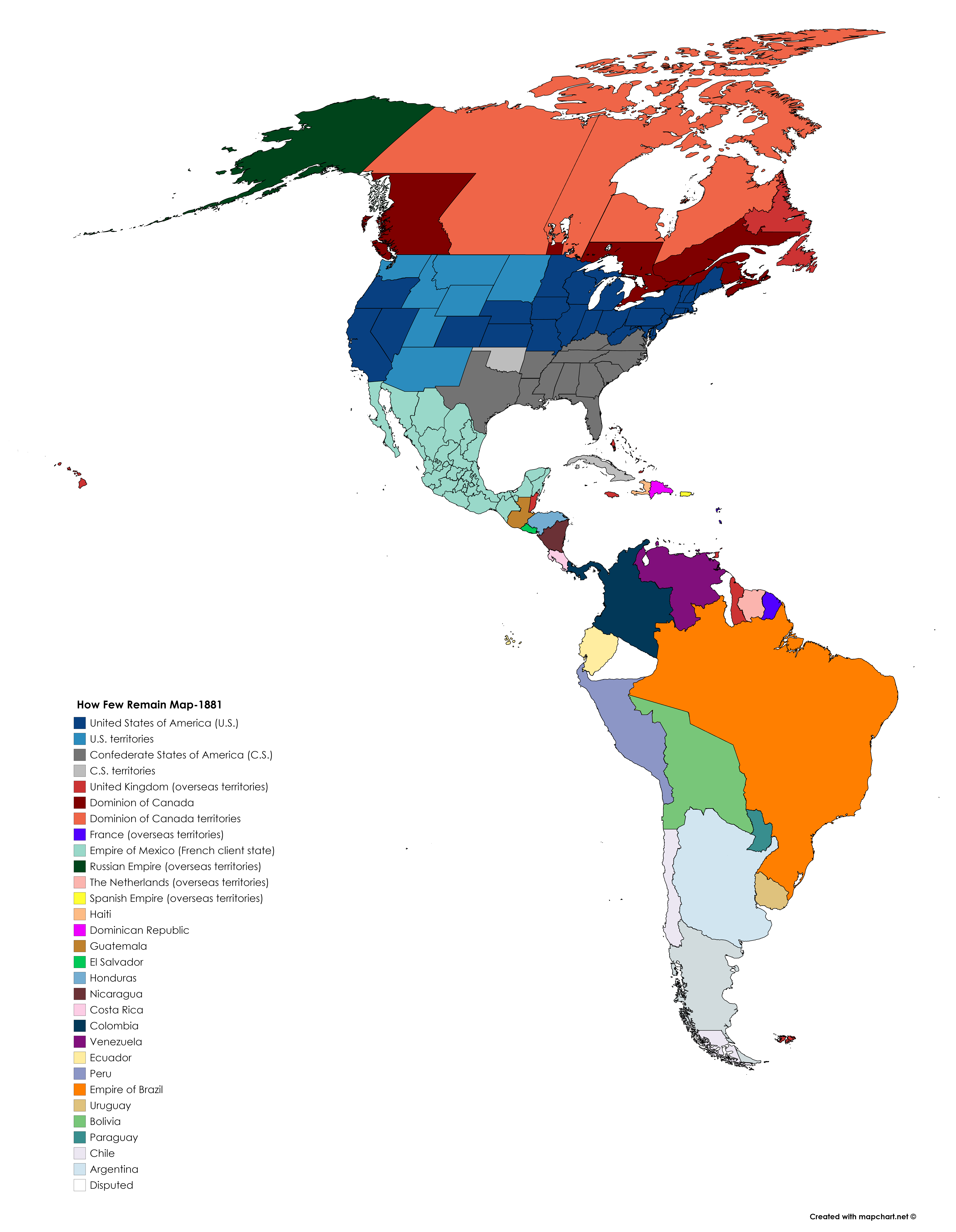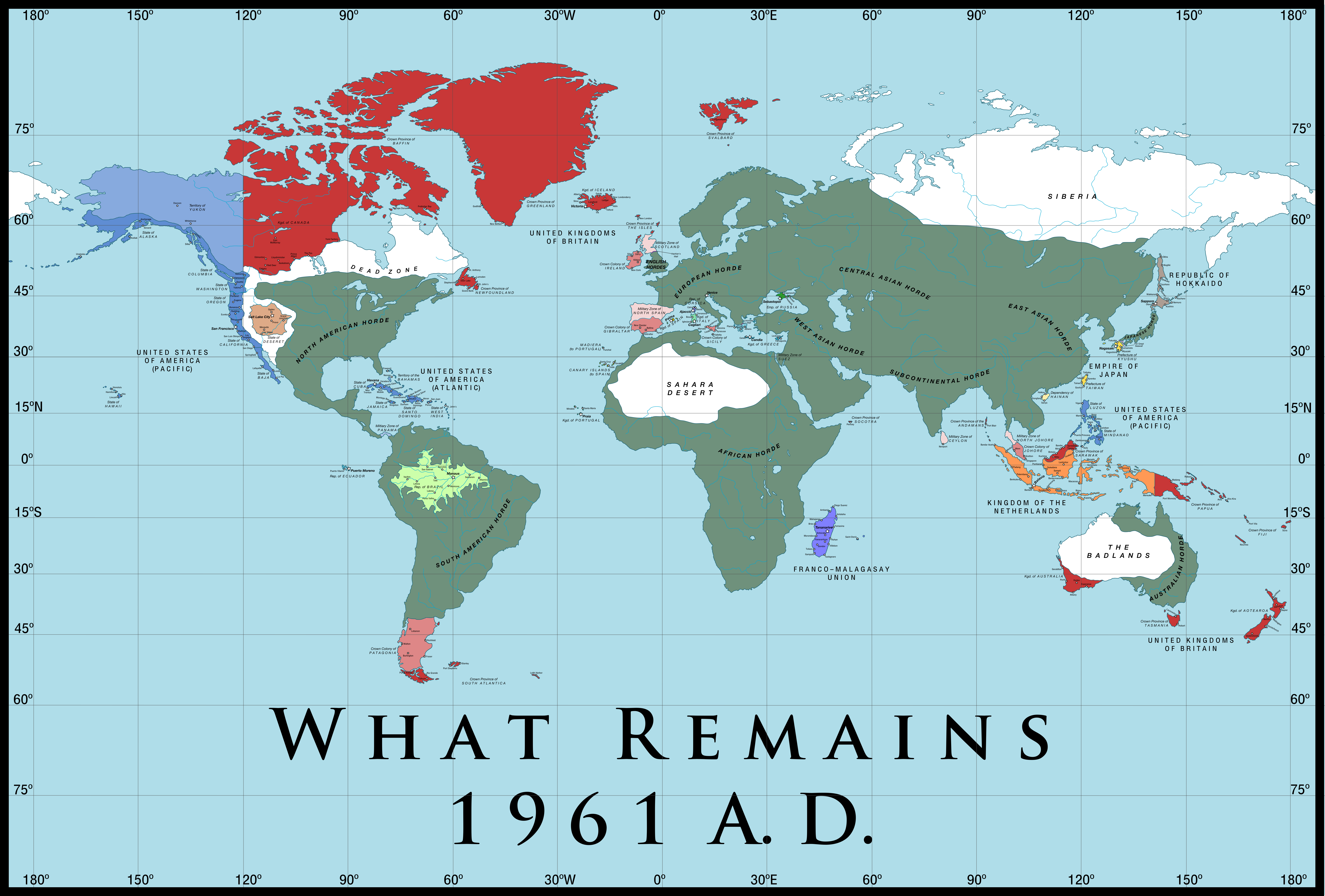HOME | DD
 SRegan — Not Quite Grasshopper - an alternate history map
SRegan — Not Quite Grasshopper - an alternate history map

#alternatehistory #coldwar #commonwealth #map #usa
Published: 2014-11-19 19:36:27 +0000 UTC; Views: 9313; Favourites: 53; Downloads: 61
Redirect to original
Description
"The huge British tanks came on. Another building, it might have been an apartment house or a store, a school or office; he could not tell -- the ruins toppled, slid into fragments. Below in the rubble another handful of survivors buried, without even the sound of death. Death had spread out everywhere equally, over the living, the hurt, the corpses layer after layer that already had begun to smell. The stinking, quivering corpse of Berlin, the eyeless turrets still upraised, disappearing without protest like this one, this nameless edifice that man had once put up with pride."The Man In The High Castle by Philip K. Dick
This is something I've been throwing around for a while based on 'The Grasshopper Lies Heavy', the book-within-a-book in Philip K. Dick's Axis victory novel The Man In The High Castle. I've seesawed back and forth for a while between 'true to the source material', which would involve Britain annexing everything up to the Volga (!!!) and a much looser realistic Britwank post-WW2 before settling on the following.
As per the book, the POD is Zangara failing to assassinate FDR (in the broader world of TMITHC he succeeds). However, I was struck by the notion that nowhere does Dick mention what happened to Anton Cermak, IOTL hit by the bullet meant for FDR. So, I posited that TGHL's point of divergence from our world is that Zangara fails to kill Cermak. FDR is butterflied away from seeking a third term in 1940 and as per the book endorses Rexford Tugwell.
The book's explanation for how this aids matters is somewhat confused - the USA adopts strong anti-Nazi measures, so Hitler reneges on the Tripartite Pact and doesn't declare war on the USA (?), which is apparently content with this (??), which somehow helps Britain casually win the war in Europe (???), but they resent the USA for not helping (????) and this leads to a Cold War situation which (a racist, still-colony-owning) Britain wins.
Anyway - my take: Butterflies since 1933 lead to a stronger global economy (though not strong enough to butterfly away the Nazis' rise to power) and both the US and Britain have comparatively higher industrial capacity than OTL.
Tugwell acts much like FDR but adopts a Japan-first policy, leading to tensions with the British.
Britain loses the Expeditionary Force, with Churchill only narrowly avoiding a coup from the usual suspects (-cough-Halifax-cough-) with the backing of William Slim , who had been recalled to Britain to take charge of home defences. Churchill seizes near-dictatorial power and implements a policy of total mobilisation, authorising the creation of a new armoured force that heavily cribs from the German playbook in Western Europe, but further integrates it into a modern combined arms doctrine.
The Soviet Union is comparatively weaker than OTL, but Britain wins quickly and decisively in North Africa and moves their armies through Turkey, denying Germany Baku oil (in the book, the turning point is still Stalingrad, but British intervention is presented as critical in turning the tide). Mussolini's government falls and Italy switches sides. Britain, now dominant in the Mediterranean, launches an attack through the Balkans.
British armoured divisions enter Berlin first from the South and East and Hitler is captured and stands trial with other high-ranking Nazi officials. Germany and Italy are forced into a British and French-dominated 'United States of Europe'; under guise of permitting limited union for the German peoples of Europe, a Customs Union between Germany and Austria is created - under the control of the USE this effectively prohibits Germany from exporting any products that might compete with British or French goods and commits them to buying any goods they cannot produce themselves from USE nations.
Meanwhile, Japan has been crushed as OTL. A weaker Soviet Union, more dependent on the Western Allies for its victory, is forced to settle for a more generous line in Poland and East Prussia. When Stalin dies on schedule in 1953 his successors adopt policies of reform that ultimately lead to the collapse of the Soviet Union around the time the other empires' colonies are seeking and receiving independence - historically the Soviet Union is thus seen as a continuation of the Russian Empire under a different ideology rather than anything unique.
An alt-Suez Crisis sees a stronger Britain calling the USA's bluff and establishing tripartite control over the Canal with France and Israel. The US responds by supporting the *UAR in future disputes.
Britain is more successful in integrating its smaller possessions (in the book Singapore in particular is mentioned, but Hong Kong is not, suggesting it was handed back on schedule) - Malta, Cyprus, the Bahamas and Maldives amongst others all choose to remain in close association with the UK. The Gambia and Sierra Leone also stay on board.
A more successful policy of federation means Britain actually has less direct possessions (but a relatively powerful and friendly Commonwealth Realm) in the Caribbean. The Commonwealth is also swelled relative to OTL by Denmark, Norway, Portugal, Greece and, a legacy of the war, France, as well as keeping hold of the Gulf states and Burma. Later additions will include breakaway Congo states, Angola and Mozambique. A major loss will be India - in any plausible timeline a snowballing and increasingly muscular Commonwealth will be of very little appeal to India, who also wish to remain unaligned as tensions with the USA over trade rights in Europe and former colonies ratchet up. This does however mean the UK can more plausibly continue to present itself as first amongst equals in the Commonwealth club. *Pakistan isn't happy about Britain's deals with Israel but received a more generous settlement at partition and sees the benefit of receiving first preference from the nations of the USE when trading in South Asia.
Meanwhile the RoC has won the Chinese Civil War, not having to contend with the Soviets handing over Manchuria to the Communists and have been converted, as per the book, into a massive economic colony for the USA, in a reversal of OTL trading raw materials for finished American goods. Japan, Korea, Siberia, South East Asia and Indonesia similarly fall into the American sphere of influence, with defeated powers in WW2 forced to sign treaties which give the USA 'favoured nation' status. However, it isn't long before Britain and the USE come knocking, even as the USA foments unrest in Singapore...
Related content
Comments: 7

👍: 0 ⏩: 1

One of my favorites. I used this as an inspiration for my own Allied-wank map: rvbomally.deviantart.com/art/W…
👍: 0 ⏩: 1

Cheers - must have missed that one on AH.com but it looks great - going to peruse now!
👍: 0 ⏩: 0




























